| Srl | Item |
| 1 |
ID:
119734
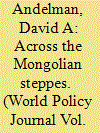

|
|
|
|
|
| Publication |
2011.
|
| Summary/Abstract |
ULAANBAATAR, Mongolia-"Before we begin, I'd like to decline two questions," the National Security Adviser to Mongolia's president warns me. "One is railroads, the other is Chinese workers." With those caveats, Batchimeg Migidorj touches on the two third-rail issues that define her nation's precarious place in the world.
|
|
|
|
|
|
|
|
|
|
|
|
|
|
|
|
| 2 |
ID:
141100
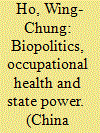

|
|
|
|
|
| Summary/Abstract |
This article endeavours to address the experience of Chinese workers with occupational disease as an instantiation of Agamben's notion of homo sacer – the ultimate biopolitical subject whose life is located outside the “normal” political, economic and cultural practices and, hence, is rendered largely silent and unintelligible in the public realm. It argues that the victimization of the occupationally sick worker has become almost a blind spot at the centre of governmentality insofar as the specific set of social regulations and power relations has created a “double ambivalence” among the victims who are constantly and disturbingly caught in between the public and private, the productive and unproductive, and the culturally normative and the culturally deviant. Such experiences of marginality contribute to the understanding of the biopolitical nature of contemporary Chinese state power, which adopts extensive “stability maintenance” (weiwen) measures to reduce resisters to a state of “bare life” susceptible to the rule of exception.
|
|
|
|
|
|
|
|
|
|
|
|
|
|
|
|
| 3 |
ID:
170982
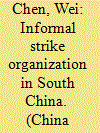

|
|
|
|
|
| Summary/Abstract |
In contrast to the workers who organize strikes in the West, Chinese workers lack support from official unions and have to rely on informal ways to strike. The previous literature suggests that worker-leaders have played a role in initiating wildcat strikes, and the engagement of labor NGOs has also facilitated grassroots activism. The focus of previous studies has been on the emergence, approaches, and strategies of the actors involved in different labor protests. However, we still know little about the direct or unintended consequences of the numerous strikes in South China. Based on fieldwork in the Pearl River Delta, this article explores how the informal strike organization built by workers, namely the "worker representative mechanism," contributes to favorable outcomes for labor. By conducting a comparative case study, this article identifies two important factors that have impacted strike outcomes: how this mechanism builds up a wider representation when the union is absent and how it sustains its core leadership for successive strikes and accomplishment of strike goals. By examining how workers build the representative mechanism that, in practice, acts as an informal strike organization, this article illustrates an alternative pattern of organization in strikes that bypasses trade unions and discusses its influences on emerging Chinese labor activism.
|
|
|
|
|
|
|
|
|
|
|
|
|
|
|
|
| 4 |
ID:
100680
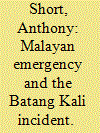

|
|
|
|
|
| Publication |
2010.
|
| Summary/Abstract |
The article describes the Batang Kali incident in which a number of Chinese workers were shot dead by the British army in circumstances which have never been satisfactorily explained. The author, who published a history of the Malayan Emergency some years ago, sets the incident in the wider context of British policy in the somewhat confused early months of the Emergency. He then chronicles the subsequent attempts to re-examine events. He then examines various suggestions that British policy was in general one of deliberate counterterror and concludes that the available evidence does not really substantiate this charge.
|
|
|
|
|
|
|
|
|
|
|
|
|
|
|
|
| 5 |
ID:
103114


|
|
|
| 6 |
ID:
091770
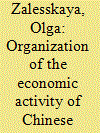

|
|
|
|
|
| Publication |
2009.
|
| Summary/Abstract |
In the 1920-1930s, the economic activity of Chinese migrants living in the Far East of Russia was essentially reorganized. Chinese workers were drawn in trade unions and cooperatives. This article describes the specific features of the trade union and cooperative movement among Chinese migrants and analyzes the role of cooperatives and trade unions in the integration of Chinese migrants in the socio-economic life of the Soviet Far East.
|
|
|
|
|
|
|
|
|
|
|
|
|
|
|
|
| 7 |
ID:
139303
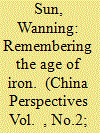

|
|
|
|
|
| Summary/Abstract |
Over the past few years we have witnessed a minor cultural phenomenon in China, with the production and enthusiastic reception nationwide of several television dramas about Chinese workers in the socialist decades. Set in the industrial plants of Liaoning in China’s northeast, once the industrial powerhouse of the socialist nation, these drama series centre on the dramatic transformation in workers’ experiences from 1949 to the start of economic reforms. In this paper I explore these series, asking: what does the smallscale production but enthusiastic reception of this genre tell us about the contemporary cultural politics of class? This paper addresses this question by (1) highlighting the key aspects of workers’ experiences with socialism as depicted in these television narratives; (2) considering the creative agenda of Gao Mantang, the script writer of the most successful industrial-themed television series; and (3) identifying some crucial ways in which the subjectivity of workers and other social groups in contemporary Chinese society intersect to shape the cultural politics of class. This discussion shows that television dramas have indeed become the basis of a widely accessible public forum that helps forge a renewed appreciation of the moral integrity of China’s working class, vent a widespread sense of injustice, and foster a certain degree of solidarity between workers and other social classes. At the same time, while television dramas about workers may hold significant potential for mobilising public support for the working class and advocating workers’ interests, this discussion also suggests that so far this potential has not been fully exploited
|
|
|
|
|
|
|
|
|
|
|
|
|
|
|
|